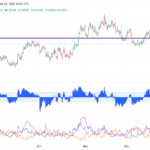FTSE 100 extends decline as banking stocks face windfall tax pressure
The FTSE 100 fell for a fourth consecutive day, heading for its worst losing streak since April’s tariff turmoil. Banking stocks led declines after a think tank called for windfall taxes on lenders profiting from Bank of England (BoE) deposits. The British pound dropped below $1.35 against the US dollar.
NatWest declined 3.4% while Lloyds and Barclays fell 2.7% and 2% respectively. The Institute for Public Policy Research argued that since 2022, the government has transferred £93 billion to cover BoE losses, effectively subsidising private sector bank profits from central bank deposits.
UK business confidence rose to its highest in almost a decade despite market headwinds. Lloyds’ survey showed two-thirds of businesses plan to hire more workers, with 80% saying payroll tax increases would have limited impact on staffing plans.
Corporate updates included Wood Group selling its North American business for $110 million and Frasers Group announcing chairman changes. Spread betting offers tax-efficient access to UK market movements.
Asian markets rise while Nvidia powers US technology rally
Asian markets tracked Wall Street gains with the MSCI Asia-Pacific ex-Japan index up 0.26%, though Japan’s Nikkei 225 slipped 0.33% on currency pressures. Regional bourses found support from overnight US technology sector strength and artificial intelligence (AI) investment momentum.
Nvidia posted a 56% revenue jump, confirming robust AI infrastructure demand and helping lift the S&P 500 and Dow Jones to record highs. Despite exceptional results, Nvidia shares barely moved, suggesting positive news was already priced in by investors.
US technology momentum extended beyond Nvidia, with Alphabet, Amazon and Broadcom advancing after the earnings report. This helped drive the Nasdaq 100’s 0.5% higher to 21,705 points, reinforcing the sector’s market leadership role.
The AI investment theme provides structural support for technology companies as enterprises accelerate digital transformation. Shares in leading technology firms offer exposure to this transformational trend.
Key economic data and policy developments await markets
Investors await US PCE inflation data for July, the Federal Reserve’s (Fed) preferred measure, with markets pricing an 85% chance of September rate cuts. The dollar heads for a 2% monthly drop as rate cut bets rise and Fed independence concerns mount.
Political efforts to remove Governor Lisa Cook have heightened anxiety about central bank autonomy. The dollar’s weakness provides support for other currencies and could influence global monetary policy expectations and capital flow patterns.
European markets await preliminary inflation figures from France and Germany. Recent ECB meeting accounts showed policymakers divided over inflation risks, highlighting uncertainty about future policy responses to economic conditions.
The combination of US inflation data and European price figures could reshape monetary policy expectations globally. Forex trading enables exposure to currency movements around these crucial releases.





















